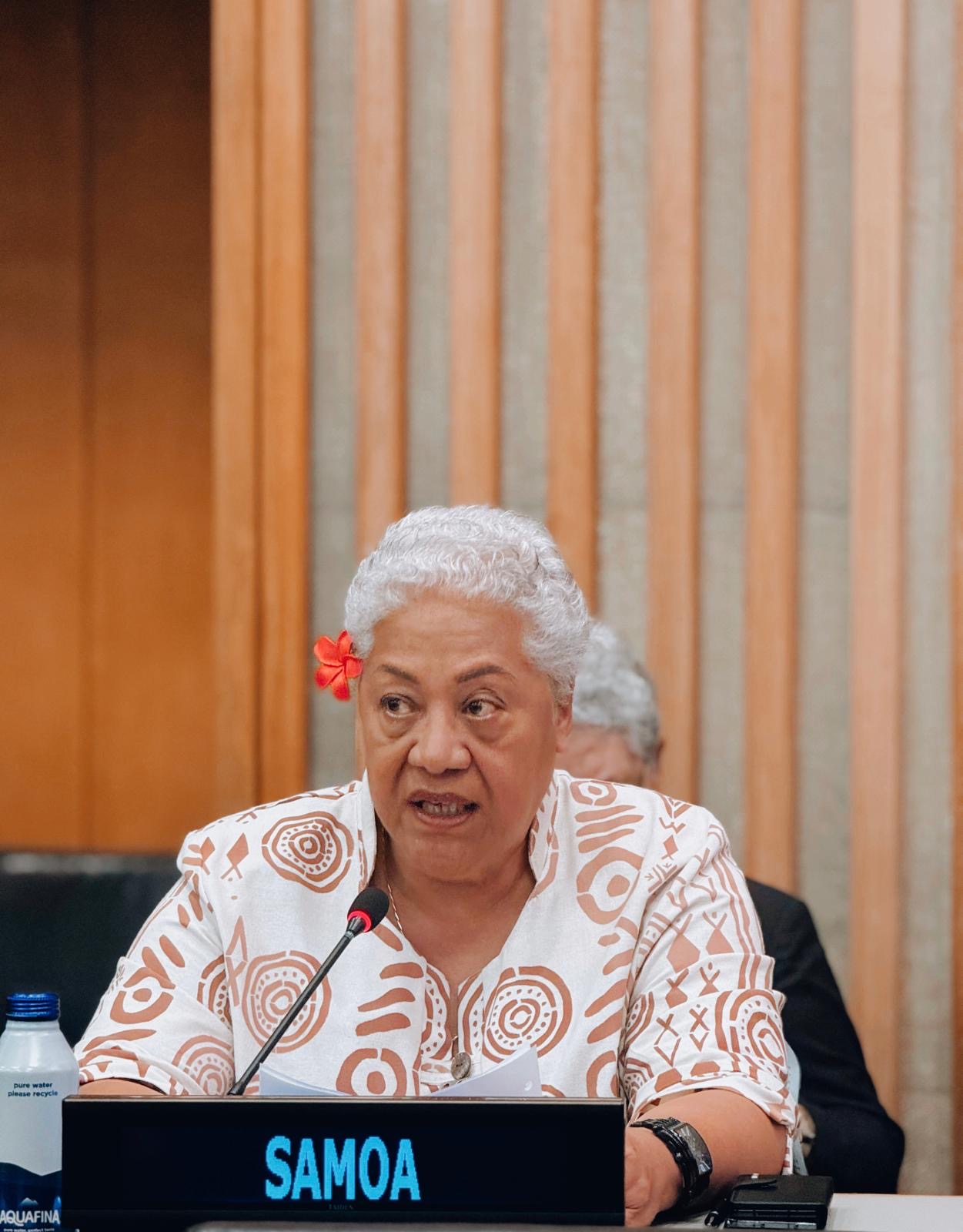STATEMENT
Roadmap to Mission 1.5: Driving the next generation of climate action and ambition
September 26, 2024 The Honourable Fiamē Naomi Mataʻafa, Prime Minister of Samoa Download PDFTopic: Climate

Roadmap to Mission 1.5: Driving the next generation of climate action and ambition 26 September 2024, 1000 – 1200 hrs at Conference Room 3 Excellencies, • AOSIS is delighted to speak here today. We welcome the joint effort by the Troika COP Presidencies to drive political momentum towards achieving the 1.5-degree goal. • Climate change is the global challenge of our time; a complex problem that goes into the heart of our economies. Thus, it is imperative that those within the international community who have the capacity, technology, and financial resources to take the lead in making 1.5 a reality do so. We see ambition in the statements and across the meeting halls but in implementation we are falling short at scale and speed with the quickly advancing crisis. Those who are in a position to do so must walk the talk, this year and every year in this critical decade for climate action. • The contribution from small islanders to this problem is negligible. Nonetheless we have submitted NDCs that are comprehensive, economy wide, and ambitious, with no back sliding despite our limited means and the economic challenges we are facing. Sadly, we do not see the same level of ambition, from countries that bear the most responsibility for this current crisis. At the global level we know that emissions must peak without delay and steeply decline thereafter to avoid further loss of lives, habitat, and economies amongst the marginalized and vulnerable. We must have the G20 at the forefront of this effort given their outsized contribution to global greenhouse gas emissions. There is no time to waste. • Responding to the GST outcome to implement the 1.5C goal is the assignment to all countries when revising their NDCs. As SIDS, we are taking several difficult political decisions to move onto sustainable resilient pathways. For example, powering our countries from fossil fuels has long been the model for our energy sectors, yet we are promoting renewable energy and constantly advocating for phase out of fossil fuels despite the profound changes this requires in all layers of our economies and governments. This bold decision might require great efforts and investments upfront, but we know that it is the right decision in the long run, and that the many benefits of the energy transition will outweigh the short-term frictions. • Our NDCs are the vehicle to operationalize all the elements of the “energy package” we agreed to in Dubai. We know that staying within the 1.5C limit is still technically feasible, our NDCs are the tangible actions that can make this a reality. New or enhanced 1.5C aligned NDCs should therefore feature measurable targets for transitioning away from fossil fuels, eliminating fossil fuel subsidies, and expanding renewable energy and energy efficiency measures. • The work of preparing these NDCs is not something we take lightly in the context of small islands. NDCs are a critical commitment and reference for our governments as they will guide not only our efforts in curbing climate change but also contribute to our countries’ development efforts. In this regard, we ensure that all the voices across our nation at all levels are included in the NDCs design. These documents are submitted with validation not only from public counterparts, but also from our private sectors and local communities. As much as SIDS have undertaken NDC development and updating in good faith we have not received the necessary support to actually implement these plans in line with our expectations and the promise of the Paris Agreement. • The Paris Agreement recognizes that different countries are at different stages of development. The special circumstances of small island developing states cannot be compared to major advanced economies. We as nations aspire to grow and develop. Our challenges and barriers are unique and well documented. Although we all face climate disasters, our ability to overcome these events is unequal. Finance, technology and capacity building are the key enablers to building resilience and bouncing back from disasters to keep thriving. • Thus, it is critical that international collaboration and finance be provided and accessible in a timely manner to strengthen country systems, build resilience and avoid delay in response to more frequent and more severe climate disasters. The NDCs plans can be be considered as opportunities for investment and collaboration. As a global community we need each other to preserve the planet we will pass to new generations. Most of our NDCs in small islands are partly conditional, because of our tight fiscal space and small private sector. Implementing our NDCs will require increasing financial flows, including by simplifying access and truly taking into consideration our needs and priorities. • We believe that a well-designed NCQG, in its quantum, structure and modalities is critical to the implementation of the GST outcome, including the Dubai “energy package”. • In conclusion, I would like to applaud the work of the COP presidencies once again for taking this bold initiative in the most critical decade to stay below 1.5C. As small islands we remain hopeful that the international community, under your leadership, will come together in Baku to agree on the NCQG and put forward ambitious NDCs, so we can keep 1.5 within reach and give small islands and marginalized people everywhere a safe and prosperous future. • I thank you. ***
Sub Topic: Mitigation
____________________________